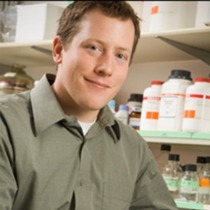(Edmonton) The Royal Society of Canada has named three University of Alberta researchers as part of its inaugural class inducted into The College of New Scholars, Artists and Scientists.
Patrick MacDonald, a leading insulin researcher in the Department of Pharmacology, has made an exceptional contribution unfolding mysteries surrounding various mechanisms of pancreatic endocrine cells. Directing a human pancreas research program that supplies tissue for diabetes research nationally and internationally, MacDonald is a sought-after contributor to research consortia, serves on the editorial boards of several top journals and holds the Canada Research Chair in Islet Biology.
MacDonald says thus far in his early career, he has been fortunate to work with a group of scientists and pharmacology students who deserve much of the credit for his success. He also credits the university, as well as the Alberta Diabetes Institute and Alberta Diabetes Foundation.
"This has made it possible for us develop an internationally recognized research program and, through our human tissue program, to facilitate diabetes research across Canada," he said. "We're committed to pursuing a greater understanding of basic human biology and the mechanisms of diabetes, and I'm excited to interact with a broader academic community through the RSC to promote scholarship and discovery."
Native studies professor Chris Andersen, diabetes pharmacologist Patrick MacDonald and women's studies researcher Chloë Taylor are joined by 88 up-and-coming researchers from research-intensive institutions across Canada in forming the college, which was created to foster interdisciplinary approaches for the advancement of understanding and the benefit of society.
Chris Andersen, an internationally respected native studies scholar, has contributed to a rethinking of Canada's past, particularly relating to understanding Métis as an Aboriginal people rather than "mixed ancestry" derivatives of First Nations and Inuit communities. Using a rare combination of statistical, archival and legal evidence, Andersen's work is charting new directions in Canadian scholarship, ushering in a new era of Métis scholarship.
He says being at the U of A has had an enormous and positive impact on his research career.
"The university has a vibrant mix of brilliant scholars on all parts of the campus and in all disciplines, which has given me a rich pool of friends and colleagues to draw on in sharpening my arguments and, ultimately, my scholarship," said Andersen. "Likewise, the Research Services Office's Research Facilitator initiative in particular was incredibly helpful in ensuring the top quality of the grants we submit for Tri-Council funding, at all phases, from the suitability of the budgets to the readability of the grant itself."
Chloë Taylor is a prolific scholar in the fields of feminist philosophy, continental philosophy and animal ethics. Her main work offers analyses of the work of French philosopher Michel Foucault and sexual crime, examines contemporary food politics and argues for a cross-species ethics of corporeal vulnerability.
Her monograph, The Culture of Confession from Augustine to Foucault, has been printed in two editions.
The Royal Society of Canada was founded in 1882 and is Canada's oldest and most prestigious scholarly institute.
